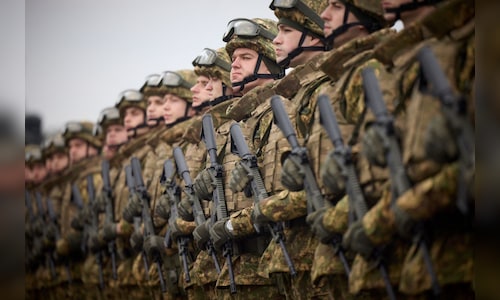US Secretary of State Marco Rubio and Russian Foreign Minister Sergei Lavrov are leading these initial discussions in Saudi Arabia.
The Kremlin has stated that President Vladimir Putin is committed to negotiating a peaceful resolution and achieving its objectives diplomatically. While Moscow has expressed openness to direct talks between Putin and Ukrainian President Volodymyr Zelenskyy, it has also raised questions about the legitimacy of Zelenskyy’s presidency.
In response, Zelenskyy reiterated that Ukraine would not recognise or adhere to any peace agreement reached without its participation. Following an emergency meeting in Paris, European leaders have also insisted on being included in any discussions shaping the future of Ukraine.
Additionally, European officials are exploring possibly deploying peacekeeping troops in the region. Meanwhile, British Prime Minister Keir Starmer has suggested that the presence of US forces could help ensure lasting stability in Ukraine.
CNBC-TV18 spoke with former diplomat KC Singh and former Ambassador to USA Meera Shankar to analyse the path forward for Russia and Ukraine.
Edited Excerpt from the Discussion:
Q: What’s the significance of having these talks between the US and Russia in Saudi Arabia in Riyadh? This was also the US President’s first foreign trip — in 2017, Saudi Arabia was the location — so this seems to be a preferred destination, but how can this help end the war in Ukraine?
Singh: The Saudis have had very close relations with the Trump family. We know their money has gone into his son-in-law’s investment fund. But that’s not the reason. Both Emirates and Saudi Arabia have played a neutral role. Even when they went to Geneva for Ukraine talks, they didn’t sign the final statement. Both of them are crucial to an agreement on the production of oil with Russia. They have an OPEC plus, and the plus is Russia. So, there is a channel that the Gulf countries have kept open to Russia.
But what is happening in Saudi Arabia today has been building up for the last 10 or 15 days. It’s not something which has happened overnight. At the Munich Security Conference, we saw that you had the American Vice President cutting Europe loose. He even did the unprecedented thing of not meeting the German chancellor but meeting with the AfD, which is the alternative for Germany, a far-right party, which he has also been indirectly supporting. The Europeans met in Paris yesterday because they realised that Trump was moving in a certain direction. The Europeans have to look at securing their security or the future of NATO with or without or with partial assistance from America. So, there is a larger game, which is afoot.
It’s always been known that President Trump has been soft on Putin. There have been allegations that we don’t know what control Putin has over him or he simply likes these autocratic, authoritarian leaders. However, Trump overestimates his ability to negotiate, and that is how he mishandled North Korea. He went around, took a step inside North Korea at the free zone, and crossed it. So, he has an overestimation of his ability. And in this case, very clearly, the signal that’s gone out is he’s engaging the Russians. They will ultimately present a deal to Zelenskyy. Incidentally, Zelenskyy was in UAE yesterday and is headed to Saudi Arabia. So, he may not be at the table, but there is some indirect connection. They are keeping him in the loop. Yesterday, he was being received by Mohamed bin Zayed, ostensibly because it’s for children to be handed back, but that’s part of dealing with the Russians. So, there’s a much larger game, which is afoot. And in that, a status quo emerges where Zelenskyy will likely have to lose all the territory, which is with Russia. What is being discussed is how you ensure the Russians don’t resume fighting after some time? What are the security guarantees? How do you ensure that Ukrainians get compensation for all the destruction done?
Surprisingly, the Americans made an offer to Ukraine — give us half your mineral wealth, and we’ll come to your aid. That is the most transactional and un-ally-like offer that could have been made to a European country, fighting to retain its territorial integrity and sovereignty.
Q: What do you think is the strategy by having direct talks with the Russians in Saudi Arabia but not having Europe on the table at this stage and not having Zelenskyy either? Zelenskyy will meet with Saudi Arabia in a few days to discuss this issue. But what do you think about the optics right now?
Shankar: Trump has signalled that he will proceed with the peace negotiations, and he’s not looking at protracted wrangling, as the Europeans were hoping.
Zelenskyy and Europe were looking at somewhat protracted negotiations, building up leverage, and so on. What Trump is signalling is impatience to get a deal done. And if Europe and Zelenskyy are not on board, then not to have them as part of the discussions.
He has had his defence secretary say very clearly to the NATO contact group that NATO membership for Ukraine is unrealistic, and it is also unrealistic for Ukraine to expect to gain back the territory it has lost since 2014. So, he’s putting the terms very bluntly on the table and putting kind of red lines for unrealistic expectations in Europe and Ukraine, which could kill the possibility of a deal and mean that there will be prolonged fighting.
As far as Europe is concerned, they are trying to have their own position, and so is Zelenskyy, where he has said that he’s not at the table in Saudi Arabia, and at the same time that he is not going to automatically accept the outcome from that meeting, in which Ukraine is not a part.
Europe is also stressing that there can be no solution to Ukraine is not a party. It has to be Ukraine-centric. So, the Europeans are positioning themselves for a nuanced difference with the US on the contours of any possible deal and negotiations with the Russians. What the outcome is going to be, I don’t know. However, Zelenskyy is very keen on security guarantees, and he wants the US to be a part of security guarantees, which will ensure that Russia doesn’t move in. The US has said they are not going to be part of security guarantees for Ukraine at this stage. So where finally a consensus emerges, I don’t know.
Putin, of course, has signalled that he wants the core issue to be addressed. That is NATO’s Eastward expansion and offer of membership to Ukraine in NATO, as well as the kind of 21st century order that there will be in Europe. He’s also signalled that he’s willing to resume nuclear discussions with the US, and Trump has also signalled that he wants to start nuclear talks, but he wants China in. He doesn’t want China out of the talks because they see that China has been expanding and modernising its arsenal. Therefore, it’s become a consequential player in this nuclear triage. There can be no meaningful agreement, which leaves China out of it.
Q: We have seen Donald Trump, and even during that conversation with Prime Minister Narendra Modi at the White House, he repeatedly said that this is a ridiculous war. It needs to end; many young people are dying every day, and he’s spoken to Putin, he’s talked to Zelenskyy, they are trying to find a way out. Do you think that both Russia and Ukraine are somehow now ready to end this war? Is Putin ready to come to a conclusion and end this war? Because that is perhaps the most important thing right now.
Singh: Putin was probably waiting to see the outcome of the US election. He knew that if Trump came in, he would have a much better deal than a Democrat would have offered him because they have sanctions on America. Now, if you are directly engaging the Russians, the Russians have brought their NATO plus agenda on the table. So, just not joining NATO is one thing. There isn’t any urgency that could have been settled without war. War was not necessary for that. But what they also want is to demilitarise Ukraine. They want certain influences of Russia or Russian language or culture to remain there. Now, he’ll have a longer list. He wouldn’t have had that list if the Americans had not straight away traded off what was on the negotiating table, which was membership of NATO or a future security order in Europe.
Now, Trump did the same thing in Afghanistan. He may keep blaming Biden for mishandling the deal with the Taliban, but he struck the deal with the Taliban, and he struck it by setting an exit date. Now, if you have an exit date, then the Taliban ultimately realised the US was … in a hurry to leave. So, you undercut your negotiating strategy. In this case, I think he has done that. He has given away your basic negotiating position. And now, it’s only a question of details, seeing how much you can press Ukraine and how to maintain a status quo. The Russians have come to Saudi Arabia with wider offers of oil – the US has lost $200 billion, and so the US oil companies can come back into Russia – so business and trade make sense to Trump. And you must remember that all this is happening alongside his trade war with China and the rest of the world. That’s April 1, when he says reciprocal tariffs are coming in. So he’s conducting a trade war, and in the meantime, he wants to break Russia away from China. He thinks he’ll be able to do this by selling Ukraine down the drain. He may or may not be able to achieve it. I think he underestimates feelings of nationalism, feelings of nationhood, that just because countries are under pressure and Europeans ultimately will have to believe that if Ukraine can be sold out today, tomorrow they’re already prepared to see American troops being pulled out from Europe. So, that’s what they would have discussed in Paris. Unfortunately, the German election is five days away. The French have emerged weaker from the last parliamentary election. The President himself is weaker. So, there is a degree of stress and political turmoil in Europe. In that, you find JD Vance, the US Vice President, urging the extreme far-right party to encourage it in Germany. I don’t know what their game is. But really, it’s highly disruptive over what is happening in Europe and the existing order.
Watch the accompanying video for the entire conversation.


